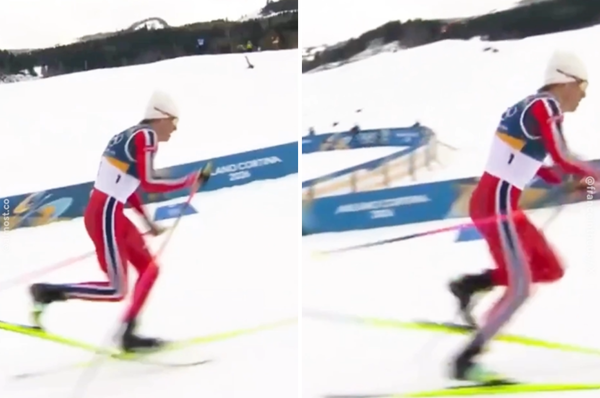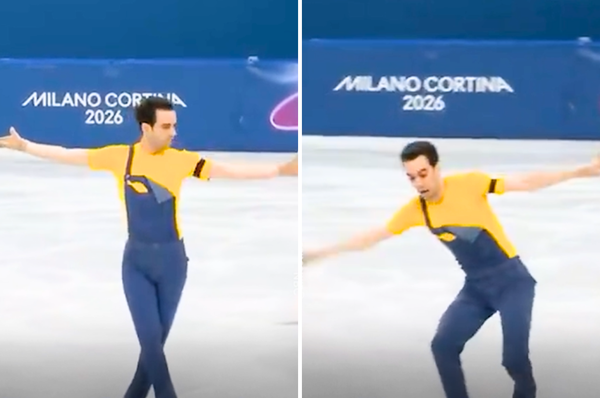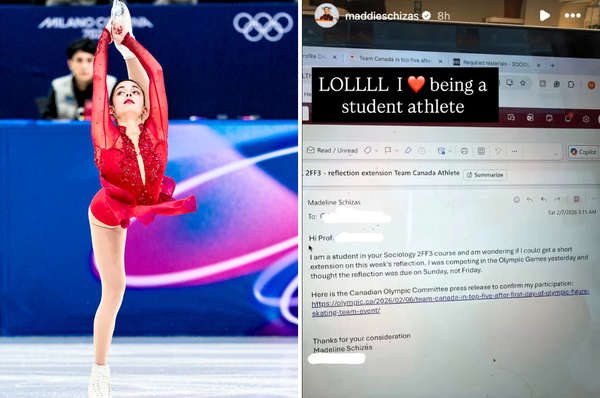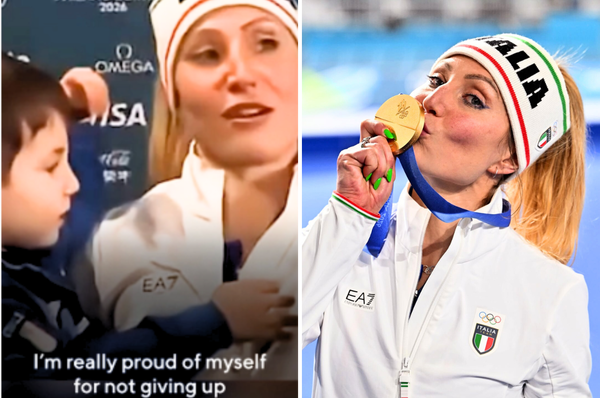From Journalists, To Journalists: Stop Helping Israel Cover Up The Killing Of Our Colleagues
Every time unverified military claims are repeated without scrutiny, every time context is stripped away, every time power is left unnamed, the press becomes a participant in oppression rather than a check on it.
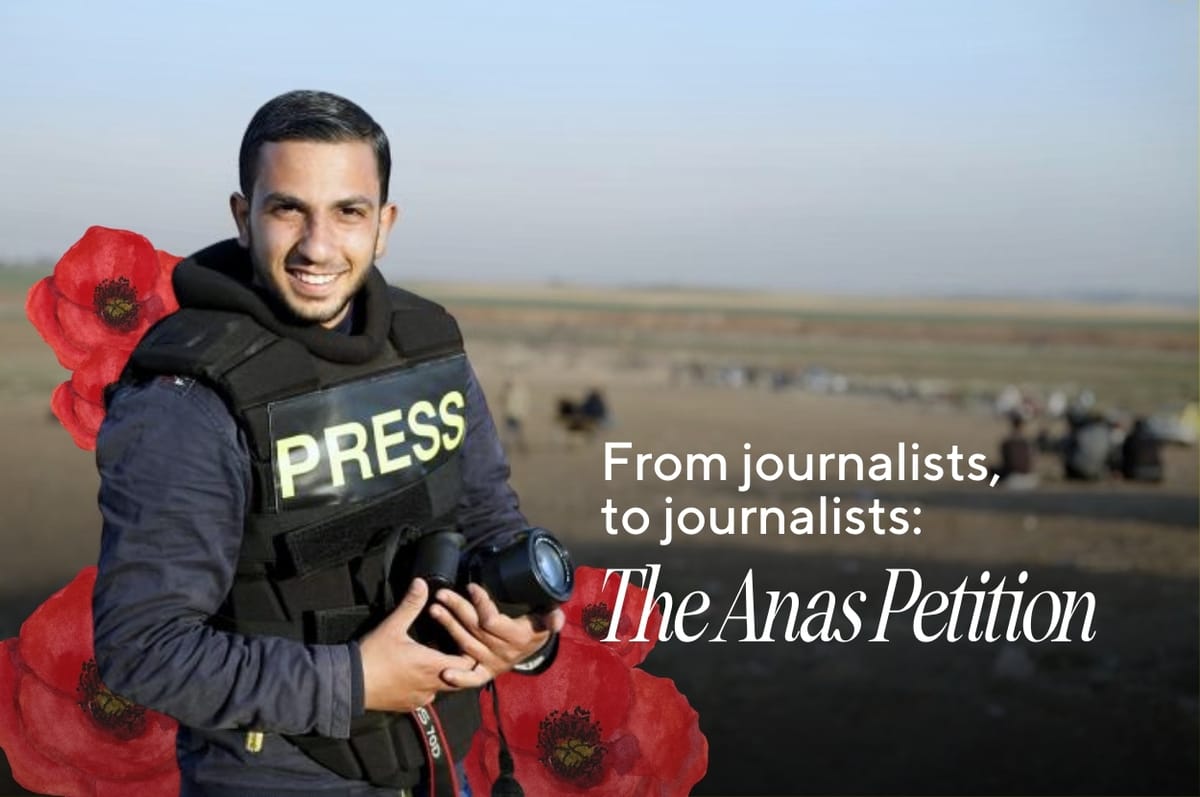
On Aug. 10, 2025, Al Jazeera correspondent Anas al-Sharif was assassinated in Gaza by the Israeli military.
The Israeli military had been threatening him in public for over a year. They smeared him after he cried on air reporting on famine. They claimed to have “evidence” that no one has ever independently verified. And then they killed him along with four other journalists in a strike on a tent clearly marked for the press.
We all saw it coming. The Committee to Protect Journalists warned weeks ago that Israel’s smear campaign was a precursor to his assassination. Journalists in Gaza feared his name would be next. And when it happened, too many newsrooms still led their headlines with Israel’s lie.
This is not a tragedy in "the fog of war"
It is a deliberate strategy:
- Threaten the journalist.
- Smear them as a militant.
- Kill them.
- Feed the smear to the international press, which repeats it uncritically.
More than 184 Palestinian journalists have been killed since Oct. 7, 2023. Many were targeted after the same sequence of public threats and unverified allegations.
The media’s hands are dirty
When Reuters runs “Israel kills Al Jazeera journalist it says was Hamas leader” as a headline, it is laundering the smear.
When The New York Times details Israel’s “documents” before mentioning they are unverified, it is giving propaganda more weight than fact.
When CNN quotes “unequivocal proof” and “many documents” without a single line about the lack of verification, it is doing the work of the military that just killed the journalist.
This is not “balance.” It is collaboration.
Press freedom statements have been pathetic
We’ve seen leaders of the profession respond with phrases like “saddened and deeply troubled” and calls for “all parties” to protect journalists.
This is the language of people who want to look concerned without naming the killer. It is PR for impunity.
Our demands
We demand that all publishers, newsrooms, editors, and press freedom organisations covering Israel–Palestine commit to:
- Stop amplifying unverified state claims. Do not publish or headline unverified allegations from any party to the conflict, especially the Israeli military, without clear labeling and immediate context on the source’s record of false or misleading statements.
- Lead with truth, not state framing. Headlines, ledes, and social media posts must prioritise verifiable facts and context over military or government narratives.
- Name power and responsibility. Avoid “both sides” language that obscures power asymmetry. When it is clear who carried out an action, name them.
- Embed context as a standard. Coverage must consistently include the structural realities: genocide, occupation, blockade, apartheid, and the humanitarian impacts, not just event-by-event updates.
- Publish your editorial policies on Israel–Palestine. Make sourcing, verification, and style guide rules public so audiences can hold you accountable.
- Correct the record publicly. When a claim you have published is debunked, remains unverified, or is changed after public criticism, update stories and headlines prominently and add an editor’s note explaining why it was changed. Acknowledge the harm caused by the initial publication, whether that harm is to the public’s understanding, to the reputation of those falsely accused, or to the integrity of the outlet. Quiet edits are not accountability; they are cover-ups.
This is not just about Anas. His killing is the clearest, latest proof of a broken system, one in which Palestinian lives and voices are routinely devalued, misrepresented, or erased in global mainstream media. It is the same system that has normalised a military occupation for decades, softened the language of apartheid, and buried the reality of siege and famine under euphemism and “both sides” framing.
The way the world understands Israel–Palestine is shaped by the stories that are told and the ones that are silenced. Every time unverified military claims are repeated without scrutiny, every time context is stripped away, every time power is left unnamed, the press becomes a participant in oppression rather than a check on it.
Our colleagues warned in 2021 that this industry’s coverage of Palestine was failing its own standards. In 2025, the cost of that failure is measured in tens of thousands of Palestinian deaths, the targeting of journalists, and a global public left misinformed about the reality on the ground.
This must end. Not with another vague statement. Not with another “tragic loss.” But with a radical change in how this story is told, because without that, the next killing will already have been written.
If you’re a current or former journalist and would like to sign this letter, please fill out the form below.
This list will be updated weekly.
Signed,
Kassy Cho – Founder & Editor-in-Chief, Almost
Sanne Breimer – Media Strategist & Founder of Inclusive Journalism
And our colleagues in journalism worldwide:
Signature count: 222
Khadija Adda-rezig – Journalist, Freelance
Nadia ADDEZIO – Journalist, Freelance
Meha Ahmad – Radio Producer, WBEZ
Mashiyat Ahmed – Journalist, Freelance
Rijad Ahmetović – Journalist & News Anchor, Radiotelevizija Federacije Bosne i Hercegovine
Ahmed Akbar – Food & Culture Writer, Freelance
Geertje Algera – Journalist & Trainer, Freelance
Ankita Anand – Independent Journalist, Freelance
Eyman Anwar – Reporter, Freelance
Jaled Abdelrahim Aranda – Senior Producer, AJ+ Español
Gibran Ashraf – Journalist / PFUJ, Independent
Devi Asmarani – Editor-in-Chief, Magdalene.co
Shaista Aziz – Journalist, Freelance
Polina Bachlakova – Journalist, Freelance
Jessica Bateman – Journalist, Freelance
Jesse Beentjes – Journalist & Media Strategist, Independent
Wulan Bekker – Journalist, BNNVARA
Alessandra Bergamin – Journalist, Freelance
Emma van Bergeijk – Reporter, NU
Robert Beveridge – Professor/Retired, University of Sassari
Tanmoy Bhaduri – Multimedia Journalist, Independent
Bibek Bhandari – Journalist, Independent
Puja Bhattacharjee – Journalist, Independent
Jaap Van den Biesen – Video Journalist, Freelance
Angelo Boccato – Journalist, Freelance
Arnoud Bodde – Journalist, Freelance
Laila Broja – Journalist, Freelance
Sedat Bugdaci – Broadcast, Independent
Haris Buljubasic – Producer, Freelance
Manuela Callari – Independent Journalist, Freelance
Camillo Cantarano – Reporter, Independent
Khalil Cassimally – Media Consultant, Independent
Rubina Čengić – Journalist, Freelance
Sofia Cerqueira – Head of Content Strategy, Euromoney
Joy Chang – Video Journalist, BBC
Yoyo Chang – Intern Journalist, Almost
Sudeshna Chanda – Writer, Product Thinker, Freelance
Ahlam Chehabi – Writer, Independent
Alicia Chen – Journalist & Filmmaker, Independent
Flavie Chen – Editorial & Partnerships Strategist, Almost
Kang-Chun Cheng – Photojournalist, Independent
Annabelle Chih – Photojournalist, Freelance
Jennifer Chowdhury – Founder & Journalist, Port of Entry
Nithin Coca, Journalist, Freelance
Jem Collins – Director, Journo Resources
Rafaela Cortez – Journalist, Fumaça
Camille Padilla Dalmau – Founder & Journalist, 9 Millones
Amelie David – Journalist, Independent
Helen Davidson – Correspondent, Guardian
Ann Deslandes – Journalist, Independent
Lorenzo Di Stasi – Journalist, Independent
Hera Diani – Co-Founder, Magdalene.co
Gnamé DIARRA – Journalist, Independent
Anna Dijk – Journalist, De Gelderlander
Carlotta Dotto – Senior Editor, Freelance
Awarjitha Edirisooriya – Freelance Journalist & Independent Researcher
Farah Eltohamy – Investigative Reporter, Cascade PBS
Wael Eskandar – Journalist, Independent
Nadine Essmat – Photojournalist, Independent
Mohamed Fairooz – Editor, Vidivelli
Katherine Fan – Journalist, Business Insider
Sabrina Faramarzi – Managing Director, Are We Europe
Aida Fazlic – Journaliat, Freelance
Oana Filip – Reporter, Scena9
Andrew Fisher – Writer & Columnist, Freelance
Lisa Fishman – Author & Advocate, Freelance
Terrence Fraser – Investigative Data Journalist & Documentary Producer, Freelance
Gabriela Galindo – Reporter, Freelance
Matthew Caruana Galizia – Director, The Daphne Caruana Galizia Foundation
Alka Anna Goos – Journalist & Design Researcher, Fontys Journalistiek
Karlijn Goossen – Genrecoordinator Journalist, 360 NPO
Shirley Govender – Publishing Editor, Globe Post
Anne Grefkens – Journalist, Univers Magazine
Ummahan Gül – Journalist, Freelance
Coco Gubbels – Founder, Project Management in Investigative Journalism
Demi Guo – Journalist, Freelance
Neha Gupta – Movement Communicator & Former Journalist, Independent
Erin Hale – Journalist, Freelance
Salima Hamirani – Journalist & Producer, Freelance
Sarah Hannan – Retired Journalist, Independent
Misan Harriman – Photographer, Freelance
Suyin Haynes – Journalist, Freelance
Sharina Henriquez – Journalist, Independent
Brian Hioe – Founder & Editor-in-Chief, New Bloom
Samantha Ho – Regional Correspondent, Eco-Business
Vicky Ho – Reporter & Producer, Almost
Sofia Hou – Executive Producer, Almost
Irene Hollebrandse – Freelance Investigative Journalist, Freelance
Wendy Hsiao – Producer & Journalist, Almost
Rummana Hussain – Columnist/Opinion Pages Editor, Chicago Sun-Times
Dan Ignacio – Digital Editor, Outlier Media
Jeffrey Ingold – Journalist, Freelance
Zena Issa – Reporter, NOR
Isha Jain – Reporter & Producer, Freelance
Wilberry Jakobs – Video Journalist, Independent
Paul Jeursen – Journalist, Freelance
Nishita Jha – Media Creator, Freelance
MJ Johnson – Video Journalist, Freelance
Vandana K – Journalist, Freelance
Nelly Kalu – Journalist, Freelance
Divya Karthikeyan – Freelancer, Freelance
Samira Kawar – Retired Journalist, Former Middle East Editor at Argus Medua
Anisa Khalifa – Producer & Host, WUNC
Aina J Khan – Freelance Journalist, AJ+
Ryan Ho Kilpatrick – Journalist, Freelance
Maria Klenner – Photographer, Independent
Tessa Klooster – Scriptwriter, Klooster Tekst
Nish Kohli – Reporter, The Providence Journal
Kolina Koltai – Journalist, Bellingcat
Gergana Krasteva – Foreign Correspondent, Metro
Madhu Krishnamurthy – Editor, Daily Herald
Priya Kulasagaran – Writer, Freelance
Marcela Kunova – Managing Director, Journalism.co.uk
Sonny Inbaraj Krishnan – News Editor, Cambodianess
Anders Lammers – Editor, Videnskab.dk
Ashley Lee – Reporter, Almost
Lie Kuan Lee – Columnist, Freelance
Tina Lee – Editor, Unbias the News
Kris Lih – Reporter, Domino Theory
Junye Lin – Chinese Editor, Almost
Sharon Lin – Podcast Producer & Host, Freelance
Jessica Lionnel – Journalist, Freelance
Emily Liu – Podcast Producer, The Business Times
Pei Ying Loh – Head & Co-Founder, Kontinentalist
Mark Lomas – Editor & Journalist, Freelance
Vittorio Longhi – Director, Carta di Roma
Gino Lopez – Journalist, Freelance
Kathy Lu – Media Consultant, Independent
Hannah Lund – Editor, Freelance
Anisa Mahmutovic – Journalist, Interview.ba
Amir Behnam Masoumi – Journalist, Freelance
Lejla Mazlic – Journalist, Al Jazeera Balkans
Micah McCartney – Reporter, Newsweek
Devon McCole – Journalist & Editor, Greater Govanhill CIC
Milkica Milojevic – Journalist, Impuls/Ringier
Eliz Mizon – Journalism Co-ordinator & Campaigner, Freelance
Cherry Mohamed – Senior Reporter & Producer, Almost
Megha Mohan – Journalist, BBC
Cosette Molijn – Journalist, Freelance
Alba Mora – Executive Producer, AJ+
Joe Muggs – Culture Journalist, Freelance
Onesy Muller – Radio Presenter, Podcaster and Columnist, Bonte Was Podcast
Shafi Musaddique – Journalist, Freelance
Analie Gepulani Neiteler – Digital Editor & Producer, Freelance
Naj O – Journalist, Freelance
Yan Naung Oak – Founder, Thibi
Davor Obrdalj – Journalist, Freelance/ex Al Jazeera Balkans
Ade Onibada – News Reporter and Producer, Freelance
François Nel – Associate Professor of Media Innovation and Entrepreneurship, University of Lancashire
Laura Oliver – Journalist, Freelance
Sophie van Oostvoorn – Journalism & Editorial Strategy Consultant, Freelance
Siddhant P – Science Journalist, Freelance
Zoë Papaikonomou – Investigative Journalist, Freelance
Gayatri Parameswaran – Journalist & Documentary Filmmaker, Nowhere Media
Ioana Pelehatăi – Editor, Scena9
Juliana da Penha – Founding Editor & Director, Migrant Women Press
Dejan Petrović – Journalist, Radio and television of Bosnia and Herzegovina
Kendra Pierre-Louis – Journalist, Independent
Claudia Pincovski – Journalist, The Paypers
Jelena Prtoric – Journalist, Freelance/Arena for Journalism in Europe
Akhlis Purnomo – Private, Freelance
Gabriela Ramirez – Editor, Unbias the News
Ricardo Esteves Ribeiro – Journalist, Fumaça
AnaDominik Rodić – Independent Investigative/Research Journalist, BiRN and Društvo Novinara BiH, IFJ
Ángela Rodríguez – Journalist & Communications Specialist, Independent
Cindy Rombout – Journalist & Business Owner, Independent
Ruby Russell – Senior Editor, Unbias the News
Nabilah Said – Editor, Kontinentalist
Pari Saikia – Journalist, Independent
Reema Saleh – Journalist, Freelance
Javeria Salman – National Reporter, Freelance
Margaux Seigneur – Reporter, Independent
Mili Semlani – Community Manager, Independent
Zeynep Sentek – Journalist, theblacksea.eu / Arena for Journalism in Europe
Jaff Sham – Journalist, whathappenedlastweek.com
Ed SMAJIĆ – Research & Training Manager, Al Jazeera Balkans
Emma Smith – Journalist, Freelance
Gary Spinks – Copywriter & Storyteller & Journalist, Independent
Joshua Stein – Reporter, Freelance
Ioan Stoleru – Reporter, Scena9
Nancy Stuermer – Copy Editor, Contractor
Swati Tarafdar – Journalism Mentor, Independent
Miriam Tepes-Handaric – Journalist, Freelance
Meenal Thakur – Journalism Trainer and Program Manager, Transitions
Sydnee Thompson – Copy Editor, Freelance
Edison Tseng – Journalist, Freelance
Samra Tufek – Journalist, National TV
Sofia Turati – Journalist, Freelance / Marea Media
Zahra Salah Uddin – Journalist, Independent
Anna Violato – Environmental Journalist, Independent
Dirk-Jan Visser – Photographer, Freelance
Fara Warner – Executive Director, Metcalf Institute at University of Rhode Island
Mia Warren – Managing Director, Feet in 2 Worlds
Aaricka Washington – Journalist, Freelance
Amy Westervelt – Executive Editor, Drilled
Juanita Williams – Editor, allAfrica.com
Geo Vallejo – Video Editor, AJ+ Español
Laurens Vreekamp – Founder, Future Journalism Today
Lela Vujanic – Researcher & Journalist, Independent
Luna van der Waarde – Journalist & Producer, Independent
Nick Wray – News Video Producer, Independent
Cici Xiao – Chinese Reporter, Almost
Jessica Zoghary – Broadcast Journalist, Omroep HUMAN
+17 signatories withheld for safety reasons



